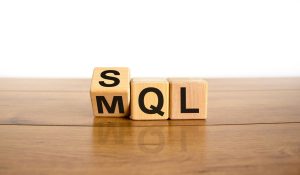
The importance of leads cannot be overstated in a B2B lead generation strategy, as they form the cornerstone of business growth. Without leads, your company’s revenue may be at risk.
However, not all leads are equal, and it’s crucial to determine which leads to nurture and how to nurture them. Lead qualification is essential as it allows you to prioritize your marketing and sales efforts. This article will concentrate specifically on B2B marketing qualified leads (MQLs), which are identified by the marketing team based on their level of readiness to engage with sales.
Let’s promptly jump into the topic, better understand a marketing-qualified lead, and concentrate on marketing qualified lead vs. sales qualified lead.
What is a Marketing Qualified Lead (MQL)?
A simple and straightforward marketing qualified lead definition is a potential customer identified as having a greater chance of becoming a paying customer than other leads based on their level of interest and engagement with the company’s marketing efforts. However, how to get marketing qualified leads? This is the question that pops up in most of our minds. MQLs are typically identified through various marketing efforts, such as email campaigns, social media advertising, content marketing, and other online or offline promotional activities.
MQLs are identified based on specific criteria, which may include demographic information such as age, location, and job title, as well as behavioral data such as website visits, downloads, and engagement with marketing materials.
Once an MQL has been identified, marketing teams often use targeted campaigns and other tactics to nurture the lead and push them further down the sales funnel, eventually leading to conversion. MQLs are an essential part of a company’s marketing strategy, as they help to identify high-potential leads and focus efforts on those most likely to result in revenue growth.
However, MQLs are often confused with B2B Sales Qualified Leads (SQLs). They’re both different stages in the sales funnel. Let’s understand the difference between them.
Improved Comprehension of MQL vs. SQL
| MQL | SQL |
|---|---|
| MQL refers to a lead more likely to become a paying customer based on their engagement with marketing materials or other criteria. | SQL refers to a lead that has been further qualified by the sales team with a higher likelihood of making a purchase. |
| MQLs are typically identified by the marketing team and passed along to the sales team for further qualification. | SQLs are typically passed along by the sales team for follow-up and conversion. |
| MQLs are typically earlier in the lead qualification process and may require further nurturing before becoming SQLs. | SQLs are additionally down the funnel and more likely to be ready for conversion. |
MQLs and SQLs are essential in the lead qualification process, but they represent different stages and require different levels of qualification and follow-up.
Why Is MQL Important?
An MQL or Marketing Qualified Lead is important for several reasons:
- Better targeting: MQL helps target potential customers who have shown interest in your product or service. This enables the marketing team to focus their efforts and resources on leads that are more likely to convert.
- Sales and marketing alignment: MQL enables better alignment between the sales and marketing teams. Marketing teams can pass on qualified leads to the sales team, who can then focus on closing deals with the most promising leads.
- Better lead management: MQL helps better manage leads by allowing marketing teams to prioritize leads based on their level of engagement with the company. This enables the sales team to focus on the leads most likely to convert, resulting in higher conversion rates and improved revenue.
- Improved customer experience: By identifying potential customers who have shown interest in your product or service, MQL allows you to tailor your marketing efforts to their specific needs, resulting in a better customer experience. This can lead to increased customer loyalty and higher lifetime customer value.
Also Read: The Definitive Guide to Converting More Leads
By focusing on MQLs, companies can optimize their marketing and sales efforts, resulting in better revenue growth and a more efficient lead management system. It also helps companies prioritize their marketing and sales efforts and allocate their resources more effectively, resulting in a better return on investment (ROI) for their marketing spend.
How Do You Identify and Qualify for an MQL?
How to generate B2B marketing qualified leads? To identify and qualify an MQL, a company must first establish specific criteria for a lead to be considered an MQL.
These criteria can include the following:
- Demographic information
- Job title
- Company size
- Location
- Type of business or organization
- Behavioral data
Once these criteria have been established, a company can use various tactics to identify and qualify MQLs. These tactics can include:
- Lead Scoring: Lead scoring is done by assigning a score to each lead based on their demographic and behavioral data. This score helps to determine the likelihood of a lead becoming a paying customer, and those with a higher score are considered more qualified.
- Forms and Landing Pages: Companies can use forms and landing pages to collect specific information from potential customers. This information can be used to determine whether a lead meets the criteria for an MQL.
- Engagement Metrics: Companies can track how potential customers engage with their marketing materials, such as emails, social media posts, and website content. This data can be used to determine which leads engage more deeply with the company’s marketing efforts and are, therefore, more likely to convert.
- Sales and Marketing Alignment: By aligning sales and marketing teams, companies can establish specific criteria for MQLs and create a shared definition of a qualified lead. This can help ensure that the right leads are targeted and that sales and marketing efforts are aligned toward a common goal.
Also Read: The Definitive Guide to Marketing Automation MPG
The key to identifying and qualifying an MQL is establishing clear criteria and using various tactics to collect and analyze data on potential customers. By doing so, companies can focus their marketing and sales efforts on those leads most likely to generate revenue.
Common Examples of a Marketing Qualified Lead (MQL)
Prospective customers engage in various lead marketing activities that help to categorize them as an MQL. These activities often complement lead scoring, campaign analytics, B2B intent data, and demographic data.
Here are some of the most prevalent instances of actions that qualify a lead as a B2B marketing qualified lead:
- Whitepaper or other high-value content downloaders
- Webinar registrants
- Product demo requesters
- Social Media or Google ad engagers
- Website Visitors
- Signing up for your mailing list or newsletter
Overall, MQLs can come from a variety of marketing channels and activities. The key is to identify those leads who have demonstrated a high likelihood of becoming paying customers and focus marketing and sales efforts on nurturing those leads toward conversion.
Ways to confirm your marketing qualified lead
Before disqualifying a lead at the MQL stage or passing it to the sales team for further follow-up, there are some fundamental questions to consider. Here are some questions that can be used to validate a marketing qualified lead:
- Does the account match your ideal customer profile (ICP)?
- Are the contact details valid, accurate, and verified?
- Has the contact demonstrated interest in receiving more information from a sales representative, typically by requesting a demonstration?
- Is the sales team ready to act immediately and promptly follow up with the lead?
How To Get Marketing Qualified Leads?
Generating B2B marketing qualified leads (MQLs) is critical to any successful marketing strategy. Here are some steps that answer your prime question about how to generate marketing qualified leads:
- Define your ideal customer: The first step in generating MQLs is identifying your target audience. Define your ideal customer profile (ICP) based on demographics, job titles, and pain points.
- Develop buyer personas: Once you’ve identified your ideal customer, create detailed buyer personas for each group. This will help you better understand their needs and preferences, enabling you to create targeted marketing campaigns.
- Create valuable content: Develop valuable content that speaks to your buyer persona’s pain points and interests. Your content should solve their problems, educate them on industry trends, and offer insights demonstrating your expertise.
- Optimize your website for lead generation: Your website should be optimized for B2B lead generation. Use landing pages, forms, and calls-to-action (CTAs) to capture lead information.
- Use social media: Social media platforms can be a great way to generate MQLs. Identify which platforms your target audience is active on and develop a social media strategy that provides value to your followers.
- Leverage email marketing: Use email marketing to nurture your leads and move them through the buyer’s journey. Develop targeted email campaigns that provide value and encourage leads to take the next step.
- Measure your results: Track your marketing campaigns and measure your results. This will help you identify what’s working and what’s not, enabling you to refine your strategy and generate more MQLs over time.
Generating MQLs is an ongoing process. Continuously review and optimize your marketing efforts to maximize your lead generation potential.
Also Read: The Definitive Guide to Converting More Leads
Conclusion
Examples of B2B Marketing Qualified Leads include website visitors who have downloaded a company’s white paper or filled out a contact form, attendees of a company’s webinar or event, and individuals who have signed up for a company’s newsletter or email list. These actions show a level of interest in the company’s products or services and indicate that the lead may be a good fit for the company.
Overall, MQLs are an essential part of the sales and marketing funnel, as they help to identify which leads are most likely to become paying customers and, thus, where the marketing team should focus its efforts. By understanding the difference between MQLs and SQLs, companies can optimize their sales and marketing strategies to improve their conversion rates and overall revenue. Binary Demand can guide you to help your business identify and qualify MQLs for achieving success. Contact us today!











